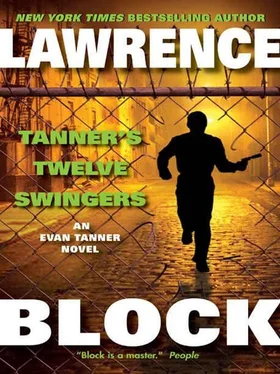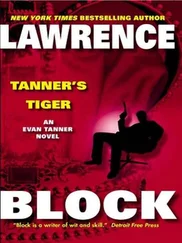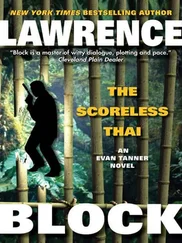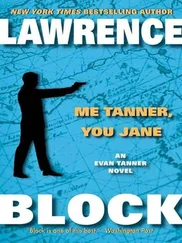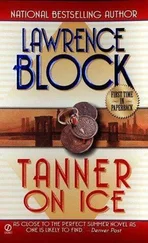“I do?”
“It is noticeable, yes.”
“I have been associating with Letts in America.”
“Well, they are good people, of course. It is unfortunate, though, that their language is a corruption of the pure Lithuanian.”
The Letts feel that Lithuanian is a corruption of the pure Lettish. We talked some more, and I told her we would require a change of clothing. I didn’t bother saying anything about identity cards. Hescha was a sympathizer, not a conspirator, and a bit senile in the bargain. The less she knew about our destination, the better off we were. And it was highly unlikely she would have the sort of connections able to provide false papers or passports.
She brought us clothing, good farmers’ clothing, including a fine pair of boots for me that I couldn’t possibly wear. They matched the rest of my clothes far better than the Polish business shoes, but to give up my Polish shoes would be to abandon the damned spools of microfilm in the heels. I scuffed up the shoes so that they didn’t jar too obviously with the rest of my costume. They would have to do.
“Tanir,” she said. “I have a thing to show you, you will be most excited. No one in America knows, I have told no one. Your friend, he is not Lithuanian, no?”
I agreed that Milan was not Lithuanian.
“Then, he can wait here. We will not be long, he would not be interested. But you I show. It is all right?”
I translated the gist of this for Milan. He did not at all mind the thought of being abandoned to silence for a time. The unfamiliar Lithuanian was ringing in his ears.
We walked several blocks. Hescha’s carefree manner changed markedly on the way; the little old woman, her shawl pulled tightly around her, looked over her shoulder and peered around corners so busily that I was afraid her excess of precautions would inevitably draw attention to us. Fortunately we reached our destination before this happened. She led me into a doorway, then down a long flight of unlit stairs, then pushed a metal barrel aside to reveal a hidden door. She opened the door with a small key, stepped quickly through, and drew me in behind her. Then, swiftly, she closed and bolted the door.
Inside the windowless room, illuminated by a solitary kerosene lantern, sitting up straight in a tiny narrow bed, was as beautiful a child as I had ever seen in my life.
The little girl regarded us solemnly. Hescha said, “Minna, this is Mr. Evanis Tanir from America. Tanir, this is Minna.”
Minna and I said hello to each other.
“You know who she is?” Hescha whispered furiously.
“Of course not.”
“A direct descendant of Mindaugas! A provable descendant! Provable!”
“Mindaugas-”
“The only true king of Lithuania. Over seven hundred years ago Mindaugas died, and never since that day has Lithuania had a monarch upon the throne. False kings thrust upon us by the Poles, yes. But never a king of Lithuania.”
There was a Mindaugas who died in 1263. And it was conceivable, I suppose, that this golden-haired angel of a child could be a direct descendant of his. I wasn’t especially inclined to believe it, but it was possible. I didn’t see what difference it made.
“Minna,” the old woman said, “is a very important person. You understand?”
“Why?”
Hescha looked at me as though I had gone suddenly mad. “But you must see! When the Lithuanian monarchy is restored, who will become undisputed Queen of Lithuania?”
“Zsa Zsa Gabor,” I said.
“Pardon?”
“Nothing,” I said. When the Lithuanian monarchy was restored, I thought privately, rivers would flow upstream, shrimps would whistle, and the First Law of Thermodynamics would be repealed by Act of Congress. The possibility of Lithuania regaining its independence was too remote to take very seriously (the fact that I prefer to take it seriously notwithstanding), but the idea of the restoration of the Mindaugas line after seven centuries…
The mind boggled.
“And so we must keep her here, my sister and I. My sister stays with Minna during the nights, but during the days she works, and I come here when I can. And Minna must remain in this room, hidden from the Soviet authorities, and-”
“Wait a moment,” I said. “She never leaves this room?”
“Of course not.”
“She sits in that bed, in this clammy room, and-”
“It is a comfortable room. A soft bed.”
“She never goes to school? She never plays with other children? She never gets out in the fresh air?”
“It is too dangerous.”
“But-”
“The authorities know of Minna’s existence,” Hescha said patiently. “If they found her, they would have to remove her as a threat to Soviet unity. They know she will someday be a rallying point for Lithuania. And if she were taken by them, she would be sent far from here, far from her own people. She would be brought up as a Russian, she would forget her Lithuanian heritage. Or she might even be killed-”
“That’s ridiculous.”
“Can you be certain? Would you have us take chances with the life of such a one?”
“But she must hate it here,” I said.
“She is content. Minna is a patient child, with the blood of royalty in her veins.”
“She must be lonely.”
“She sees me. And my sister.”
“But children her own age-”
“It is too dangerous, Tanir.”
I walked away from Hescha, who was still babbling, and knelt at the side of Minna’s bed. She fastened clear blue eyes upon me. Her hair was like spun gold, neatly braided and trailing all the way down her back. Her complexion, despite the dank cellar in which she spent twenty-four impossible hours a day, was still fresh and rosy.
I said, “Hello, Minna.”
“Hello, Mr. Tanner.”
“Call me Evan, Minna.”
“Evan.”
What did one say to a child. “How old are you, Minna?”
“Six years. Seven in March.”
“Are you happy here?”
“Happy?” As if she did not wholly understand the concept. “I have books to read. Hescha is teaching me how to read. And dolls to play with. Happy?”
Hescha was still carrying on. I ignored her. I said, “Minna, how would you like to go on a long journey? How would you like to come with me to America?”
“ America?” She thought about this. “But I am not allowed to go outdoors,” she said. She sounded like all the little boys who try to run away from home but aren’t allowed to cross streets. “I have to stay in this room forever,” she said seriously.
“If you come with me, you will not have to stay inside.”
“Is there sun in America? And snow and rain?”
“Yes.”
“And are there other children in America? And do children play games and go swimming and go to school? And are there dogs and cats and sheep and goats and pigs there? And lions and tigers?” She motioned toward an orderly pile of books. “In my books there are all such things for children.”
“There are all those things,” I said.
She put a very small hand in mine, and I gave her hand a squeeze, and she beamed at me with the largest eyes on earth. “Then I will come with you,” she said.
The Russians makedreadful automobiles. The design is adequate, I suppose, if one prefers to regard an automobile as something that ought to be made purposely lacking in aesthetic appeal. But if the object is to produce purely functional vehicles, then the very least they should do is function. Ours did, but barely. The engine knocked, the crankcase leaked oil, and the few modest hills we climbed were an enormous strain on the poor thing. The only good thing to be said for the car was that some poor fool had left the key in the ignition, and I had thus been able to steal it without any difficulty whatsoever.
Читать дальше
